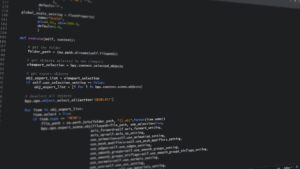Python's popularity has made it the second most popular programming language on GitHub. It is primarily due to its use in emerging technologies such as Data Science, Machine Learning, and Artificial Intelligence. It also has a strong presence in software development because of its efficiency, versatility, and ease of learning. In this post, we will discuss how to learn to program with Python.
Python is a programming language that has features that make it easy to write and read. In this case, some learners need to get Python homework help so they use special services for this purpose. However, the programmer must have a series of skills and knowledge to work with it.
Soft skills such as the ability to be self-taught, to be able to work in a team, have analytical and problem-solving thinking stand out. These are skills that you can have or that you can develop, the important thing is to have a series of specific knowledge to understand this programming language. Some of them are the following:
- To know other programming languages such as CSS, JAVA, and TypeSCript, among others.
- To have notions about relational databases. With Python, you will be able to build systems that ensure the durability of the databases created.
- The developer who wants to learn Python from scratch must know some frameworks such as Flask, DJango, or Pyramid.
- To have previous knowledge of object-oriented programming. This will allow you to organize the code into units and create objects that are related to each other.
How to Learn How to Program with Python?
There are numerous video tutorials on how to learn to program with Python, but they may divert you from your goal. Below, we will review the steps to follow to get started with learning this programming language.
Define the Reason for Learning Python
You need to find a compelling reason to learn Python, as it has to keep you engaged throughout the process, otherwise, it can be very torturous to get to the end.
So each student should find it for themselves. For example, the experts single out the following reasons: to become a professional Python developer, be it in Data Science, Machine Learning, Data Analytics, Artificial Intelligence, or any other subject.
Learn the Basics
Learn the syntax, and the essentials of the programming language such as variables, data types, functions, and so on. In addition to theory, you need to practice a lot. Write simple code on your own or through Python tutorials you see. Once you have the basics down, you can move on to advanced topics.
It's time to use what you've learned in a project you create from scratch. These types of exercises will unleash your potential and help you learn in the process. In addition, these projects can be put into your portfolio for your job search.
You can create structured projects on data science, machine learning, websites, mobile applications, games, and automation scripts, among many others. Also, you will find many resources for structured projects such as Dataquest, Scikit-learn documentation, Learning Robotics using Python, and Automate the Boring Stuff with Python, to name a few sites you can turn to.
At this point along the way, you need to have learned how to find the bugs and look for their solution. In addition, you can extend previous projects, find open-source platforms to contribute to, volunteer for non-profit organizations, contribute to GitHub...
How to Learn How to Program with Python?
Collaborate with More People
Collaborating with other students and experts will help you expand your knowledge, discuss things and get tips and tricks to apply in your work. There are different Python communities, forums, meetups, and events. We can mention some of them like Stack Overflow, Python.org, Reddit, and Sololearn.
Keep Practicing
Learning programming is a never-ending process. Therefore, after you have completed all the steps, always keep practicing what you have learned. Enter the world as a full-time Python developer or as a hobbyist to create Python projects in various industry verticals.
After mentioning how to learn how to program with Python and what you need beforehand is the ideal time to take the plunge and get started with this programming language.
Do you want to learn how to program with Python? With our Full Stack Jr. Bootcamp at Learn to Program from Scratch, you will master computational thinking while getting started in the methodologies and keys to writing useful, fast, and elegant code with Python.

